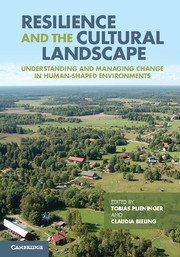 Resilience and the Cultural Landscape
Resilience and the Cultural Landscape Book contents
- Frontmatter
- Contents
- List of contributors
- Preface
- Part I Conceptualising landscapes as social–ecological systems
- Part II Analysing landscape resilience
- Part III Managing landscapes for resilience
- Part IV Perspectives for resilient landscapes
- 17 A heterarchy of knowledge: tools for the study of landscape histories and futures
- 18 Towards a deeper understanding of the social in resilience: the contributions of cultural landscapes
- 19 Resilience and cultural landscapes: opportunities, relevance and ways ahead
- Index
- References
18 - Towards a deeper understanding of the social in resilience: the contributions of cultural landscapes
Published online by Cambridge University Press: 05 November 2012
- Frontmatter
- Contents
- List of contributors
- Preface
- Part I Conceptualising landscapes as social–ecological systems
- Part II Analysing landscape resilience
- Part III Managing landscapes for resilience
- Part IV Perspectives for resilient landscapes
- 17 A heterarchy of knowledge: tools for the study of landscape histories and futures
- 18 Towards a deeper understanding of the social in resilience: the contributions of cultural landscapes
- 19 Resilience and cultural landscapes: opportunities, relevance and ways ahead
- Index
- References
Summary
Introduction
I am, perhaps, the ‘fish out of water’ in this collection of authors, as I have come to this work primarily as someone who has studied the resilience literature, instead of as an expert (indeed, even a novice) on the subject of cultural landscapes. As such, I have been asked to reflect on what the scholarship on cultural landscapes can contribute to resilience, rather than ask (as have most of the other scholars in this book) what the resilience literature can contribute to an understanding of cultural landscapes. It is, perhaps, an unfortunate balance. As I have learned from hearing the authors in this book speak at our conference in Summer of 2010 and from reading their contributions to this book, the literature on cultural landscapes and on resilience have much in common but with often revealing differences, the study of which would benefit both communities. My single contribution cannot do justice to the breadth of what a more thorough understanding of cultural landscapes might mean for the resilience community.
Nonetheless, I offer four primary ways in which I believe a study of cultural landscapes can contribute to the resilience conceptual framework; these observations find voice in and are informed by many of the other chapters in this book. These are (in no particular order):
that analyses of resilience would benefit from greater consideration of how the natural resource systems of interest are globally embedded;
that the one-way nature of the adaptive cycle is not inevitable;
that a better integration of social and ecological is needed;
that the social analyses in resilience need to be much deeper.
I first offer a brief summary of my own perspective on the resilience conceptual framework before addressing each of these points in turn. I conclude with two additional observations – one warning against a certain romanticism or political correctness that permeates (in their poorer manifestations) both the resilience and cultural landscape literature, and a final warning against the notion that every place is absolutely unique, requiring its own individually tailored analysis of challenges and solutions.
- Type
- Chapter
- Information
- Resilience and the Cultural LandscapeUnderstanding and Managing Change in Human-Shaped Environments, pp. 315 - 327Publisher: Cambridge University PressPrint publication year: 2012
References
- 2
- Cited by
